
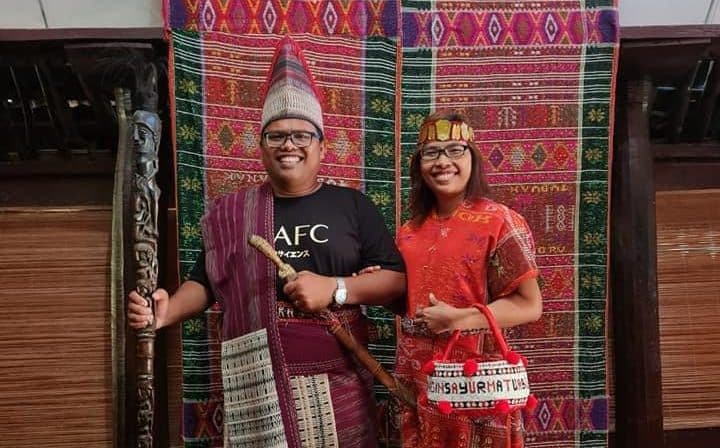
Chandra Tobing’s story has curdled the blood of former gangsters and recovering drug addicts at a halfway house in Singapore.
When the visiting Indonesian pastor shared that his ancestors cannibalised the first two missionaries who came to their tribe, no one wanted to share a room with him afterwards, he mused.
The third missionary almost suffered the same fate. “But then there was a great thunder.”
Similarly, when his life was threatened in a mountainous jungle area so remote “that not even a motorcycle can get to it”, he told the village chief: “I come from the Batak tribe in North Sumatra. I crossed two oceans to come here. I am not afraid to die.”
Chandra, now 42, told Stories of Hope: “The village chief ran away from me.”
The great explorer Marco Polo was said to have described the Bataks as ferocious people who ate the “rump to stump” of others in their practice of ritual cannibalism.
So fearsome was the reputation of the Bataks as man-eaters, it extended through and beyond the era of European colonialism.
Chandra was 10 years old when his grandfather shared the story of their ancestral history that had been passed down orally from generation to generation.
“The Batak people practised animism. But they also sacrificed humans to their god.
“They killed and ate the first two Christian missionaries who came to witness to them,” said Chandra.
The third missionary almost suffered the same fate.
“Nommensen had spent two years on a hilltop praying for the tribe before speaking with them.”
He was Ludwig Ingwer Nommensen from Germany, born in 1834 – the year that the earlier two missionaries from America lost their lives.
“Nommensen almost got killed by the Batak people. But before they could do it, there was a great thunder. The Batak people thought it was a sign from their gods, and released Nommensen,” said Chandra.
“Nommensen had understood that the Bataks were cannibals.
“He had spent two years on a hilltop praying for the tribe before speaking with them and sharing the good news of Jesus‘ love, compassion and forgiveness with them,” said Chandra, recalling what his grandfather had told him.
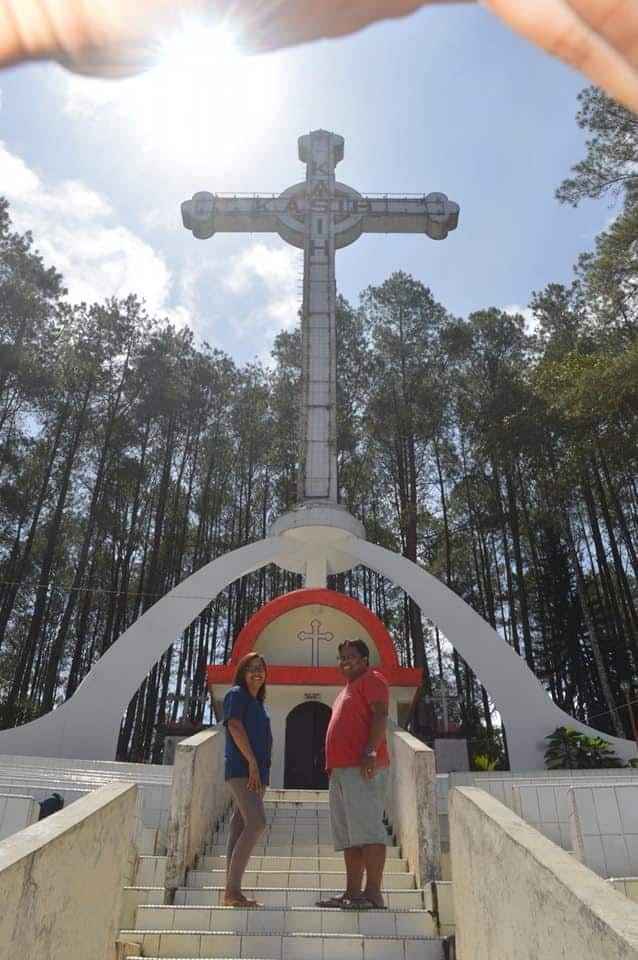
Chandra and his wife Uria at Salib Kasih (The Cross of Love) on top of the hill at Tarutung (Chandra’s hometown). It marks the area where Nommensen had spent two years praying for the Bataks. The cross is lit up at night.
The tribe’s influential chief, Raja Pontas Lumbantobing, became Nommensen’s friend, and the first Christian in 1865.
“Through his conversion, many of the Batak peoples became Christians,” said Chandra, an 18th generation Tobing from the Toba clan – the first group of Bataks to become Christian.
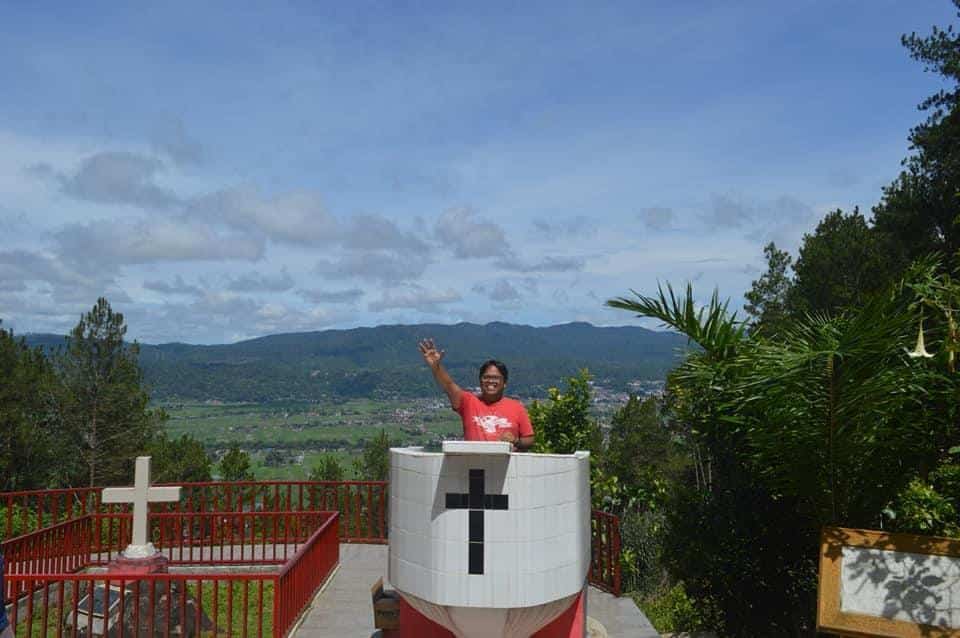
Chandra at the pulpit facing the outdoor worship arena at the prayer mountain at Salib Kasih.
“Thank God, He turned heart of the people to become believers,” said Chandra.
“The practice of cannibalism stopped when Christianity entered Batak land.”

“To prove that the story he was telling us was very real, my grandfather showed us facts – like pointing out the first Batak church (pictured) that Nommensen built, ” said Chandra.
Nommensen also established schools, hospitals, and a theological seminary in the 54 years he spent among the Batak people. He was buried in Tarutung when he passed away in 1918.
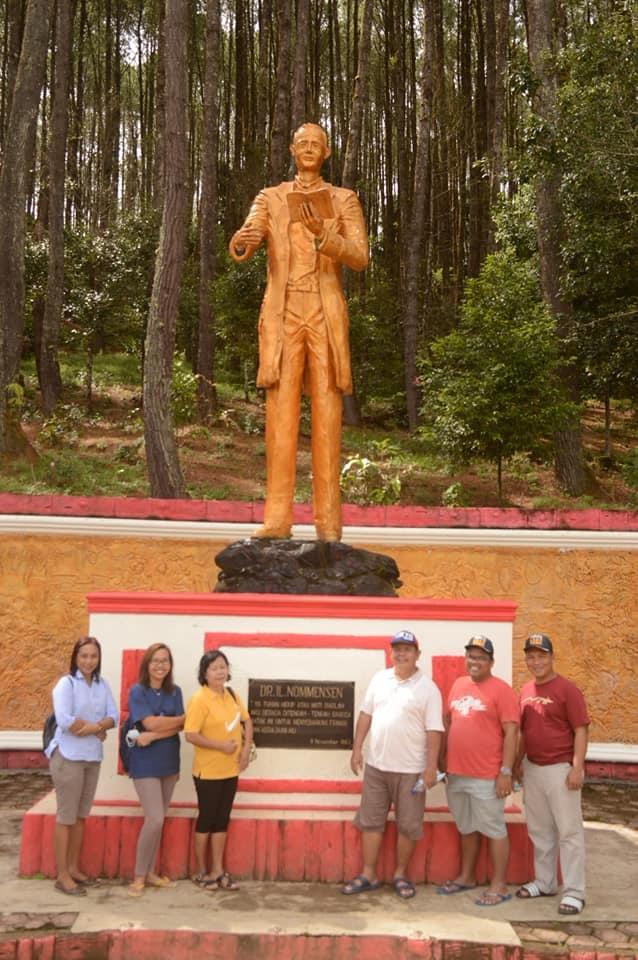
At the statue of Nommensen – the Apostle of the Batak – at Salib Kasih. There are also small houses where visitors can pray at the prayer mountain.
“Tarutung is blessed by God,” said Chandra, recalling what his grandfather had told him.
Chandra’s grandfather also shared that the village where the two early missionaries were cannibalised “was very dry”.
“Whatever is planted there does not grow. It is believed that God cursed the land where the two missionaries were persecuted and killed,” said Chandra.
“My grandfather also told us that many Tobings are serving God as pastors because we have the meat and blood of missionaries in our body,” said Chandra.
“Our clan was very ferocious. But thank God, He changed us in a positive way – to have a boldness to share the good news of Jesus.”
“Many Tobings are serving God as pastors because we have the meat and blood of missionaries in our body.”
In time, Chandra would became a pastor – the first from his grandfather’s line to do so.
Chandra would also learn that that missionaries from some 150 years ago “didn’t just bring the Bible, but also their own coffins because they are ready to die” – whether from persecution, illness or storms on long voyages.
“Not just the missionary, but their family understands that the price of sharing the gospel may be their life,” said Chandra.
It is a risk that he, too, understands and accepts.
However, when Chandra was growing up, Christianity “was a religion without understanding”.
For young Chandra and many of his relatives, their passion for Christ had dulled over the generations. Chandra estimates that he is a sixth generation Christian.
He looked forward to going to church every Sunday – for all the wrong reasons.
Still, he looked forward to going to church every Sunday – for all the wrong reasons.
“I was from a poor family. We had no pocket money when we went to school during the week.
“But on Sundays, many parents gave their children money – to bribe them to go to church. So for example, if we were given 100 rupiah, 50 rupiah was to put in the offering bag, and 50 rupiah to buy snacks and drinks from the stalls outside church. But many of us only put 10 rupiah into the offering bag.”
(Chandra estimates that at that time, 100 rupiah was worth about S$0.50, the cost of four pieces of cake.)
When he was 12, his family moved to Medan city, 10 hours by bus from their village at Tarutung.
“We were staying in the slum area in Medan. I thought nobody noticed us, nobody cared for us.”
As part of the curriculum in junior high school, his teacher gave the students a notebook to write a report on Sunday’s sermon at church.
“We had to answer questions like ‘Who is the pastor?’, ‘What is the sermon he shared?’, ‘What was the Bible verse he used?’
“We then had to get the signature of the pastor with the stamp of the church. And on Monday, we would hand up our notebook to get a score from the teacher.
“So this forced me to go to church.”
When he was 14, his lukewarm feelings towards the faith changed.
“The old Indonesian song said that God really cares for us. He knows us by our name. He loves us so much.”
“We were staying in the slum area in Medan. I thought nobody noticed us, nobody cared for us.
“One Sunday, the sermon and an old Indonesian song said that God really cares for us. He knows us by our name. He loves us so much.
“I experienced the love of God, and something changed in my heart,” he said.
When the pastor invited those who wanted to ask Jesus into their lives to come to the front, Chandra went forward.
“My parents were also encouraged in their faith when our pastor diligently visited our small home in the slum and prayed for us.”
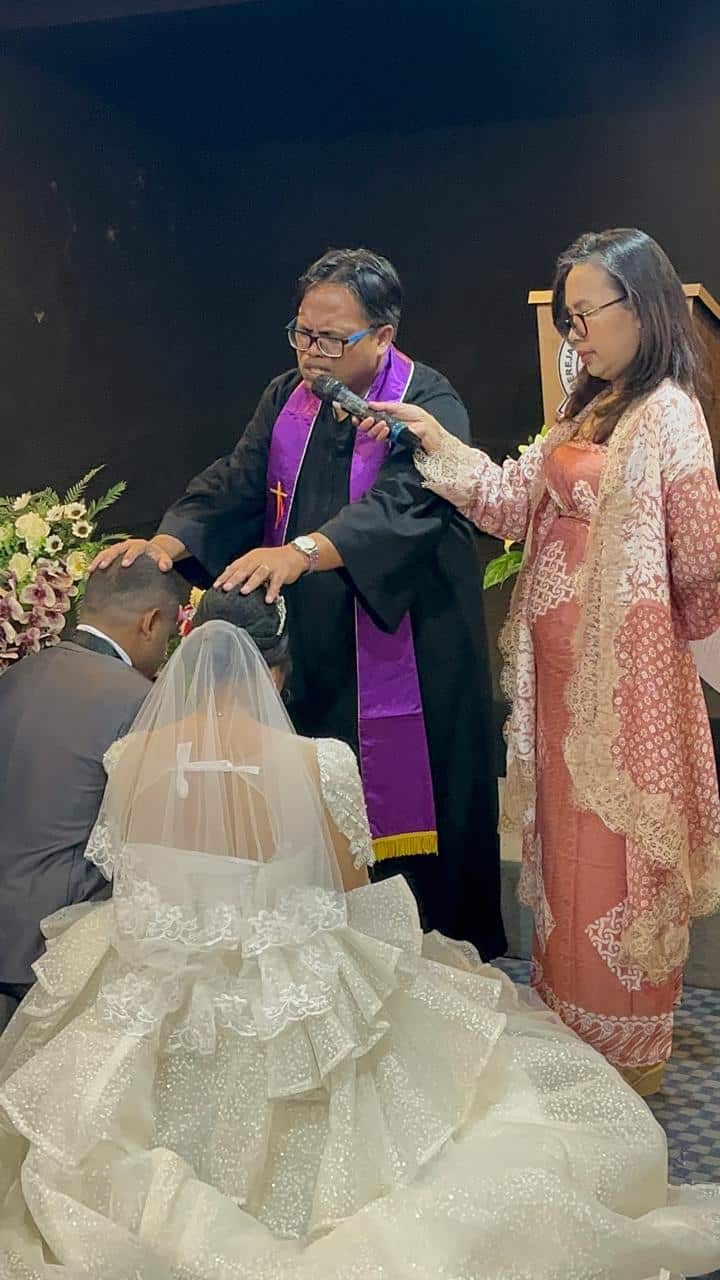
Chandra himself became a pastor in 2003.
After giving his life to Christ, Chandra noticed that God opened opportunities for him in school.
“I got better in my studies, made it to the top class, and became more confident.”
Chandra “felt joy” when encouraging others in their faith, in and outside school.
Slightly under half of the students at school were Christians, and he became their leader.
Chandra “felt joy” when encouraging others in their faith, in and outside school.
“Several friends and pastors thought that I would become a preacher. I started to pray about it,” said Chandra.
But he grappled with the decision.
“I wanted to study hard and get a good job to help my family,” he said.
As a top student, Chandra had a through track to university.
“But my parents told me, ‘We have no money to put you through university.’
“My pastor then suggested I go to missions school in Batam which was free of charge.”
The one-year course prepared its students to offer help and hope to others. Afterwards, the school sent Chandra to a remote part of Bali where tourists were not seen.
“When you are in Bible school, you feel on fire for God. But when you go into the field, it feels like a bucket of cold water has been poured onto your fire.
“The culture was very different from mine, and I had no idea how to offer help and hope to the people,” said Chandra, adding that “loneliness is what kills cross-cultural workers”.
After two difficult years in Bali, Chandra applied successfully to do a Bachelor of Theology in Singapore. He believed at that time that “this was the highest goal”.
“My reasoning? If I graduate from Singapore, I will have a better paying job as a pastor, and a better life and ministry.
“I sensed God telling me, ‘Bali is holy. Go back’.”
“But during my stopover in Singapore to visit the school, God visited me.”
While reading the Bible that night, Chandra came across the passage on Moses and burning bush (Exodus 3:1-17).
“When Moses saw the burning bush, he heard God tell him to take off his shoes ‘as the land is holy’.
“Through the passage, I sensed God telling me, ‘Bali is holy. Go back’,” recalled Chandra.
He asked God, “Why?”.
“God then gave me a vision. He said, ‘Nobody wanted to die on the cross, but I went there because I love you. If you love me, go back to Bali.'”
“Now I understood that God wanted Bali to be my new hometown,” said Chandra.
So he started making long-term plans for his work and life there – never mind that the Bible school was no longer obliged to support him with a small allowance after the two-year mark.
“Before I understood my calling from God, I didn’t really pour my heart into the work in Bali.”
He also formed relationships with people God put into his life.
“Before I understood my calling from God, I didn’t really pour my heart into the work in Bali as I kept praying for Him to take me to another place,” Chandra admitted.
“Ministries take time to grow. You can’t just be in it for two years,” he said.
When Chandra complained about his lack of finances to God, he sensed God tell him: “You’re still young, you have your hands and legs. Do something.”
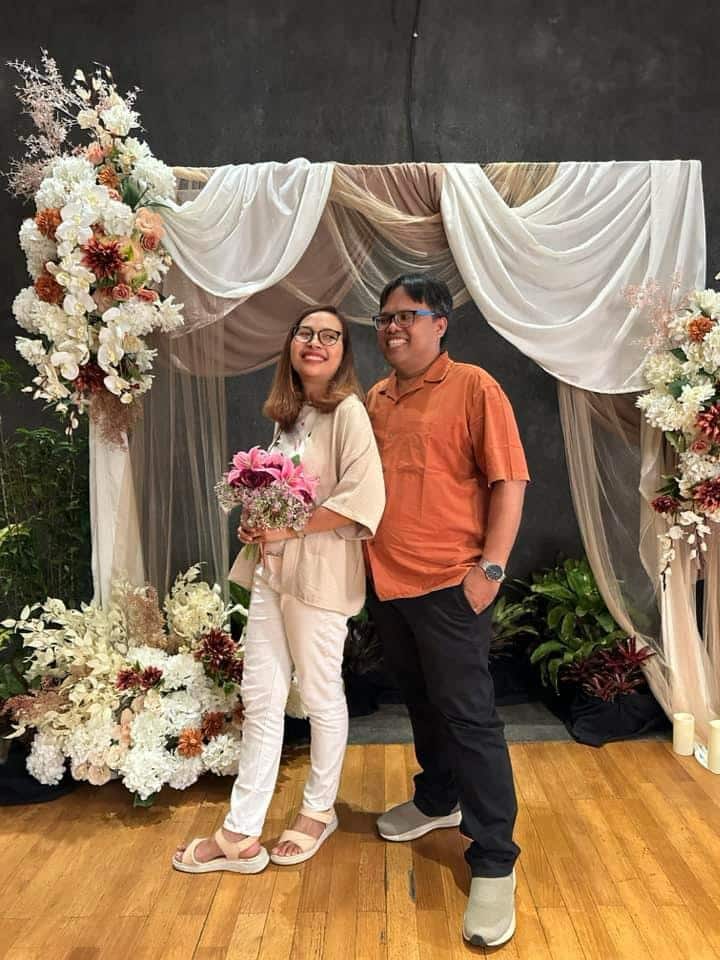
“We require our workers to support themselves,” said Chandra, who got trained in marketing and entrepreneurship to inspire church members to start their own businesses. Uria is a trained makeup artist who helps brides look their best on their wedding day.
Chandra tried his hand at a variety of businesses including giving guitar lessons. He also started work as early as 2am, making cakes which he sold at the market, or producing coconut milk to supply to a restaurant – something he still does today.
As workers were few, and the needs were many, God gave Chandra the wisdom to “copy” or multiply themselves.
With the help of a small team, Chandra started Promised Land – Bali in Denpasar to train young people to offer help and hope to various parts of Indonesia and beyond. It started with just four students in April 2004.
Chandra and his team have been working to improve the lives of communities in Bali.
Today, they have about 80 students in each cohort.
They include a handful of students from remote mountainous jungles of Papua “where it is impossible to build roads to connect villages”. One student, the child of a pastor, took nearly a month to get to Bali – including walking for two weeks to get to the nearest form of transportation. Such is the hunger to learn to serve their own community.
Chandra and his team have been working to improve the lives of communities in Bali.
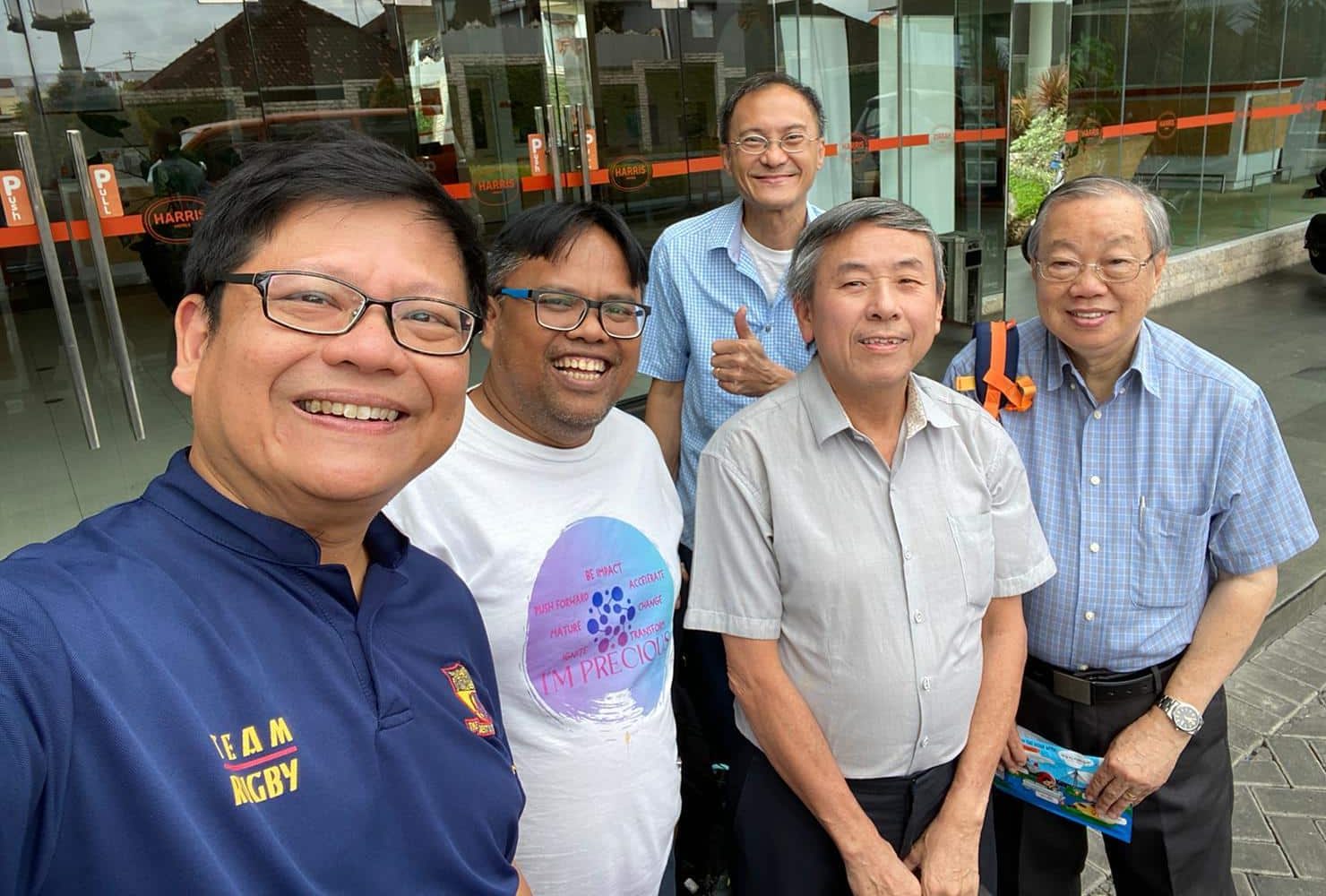
Pastor Chandra (second from left) with one of their mission partners. Community for Christ Church (CFCC) from Singapore. CFCC supports Promised Land – Bali through prayers and finances. Photo courtesy of Teo Tee Loon (left) an associate pastor with the church
“We were limited financially, but other churches and NGOs came alongside us to supply water tanks, build roads and start schools for villages,” said Chandra.
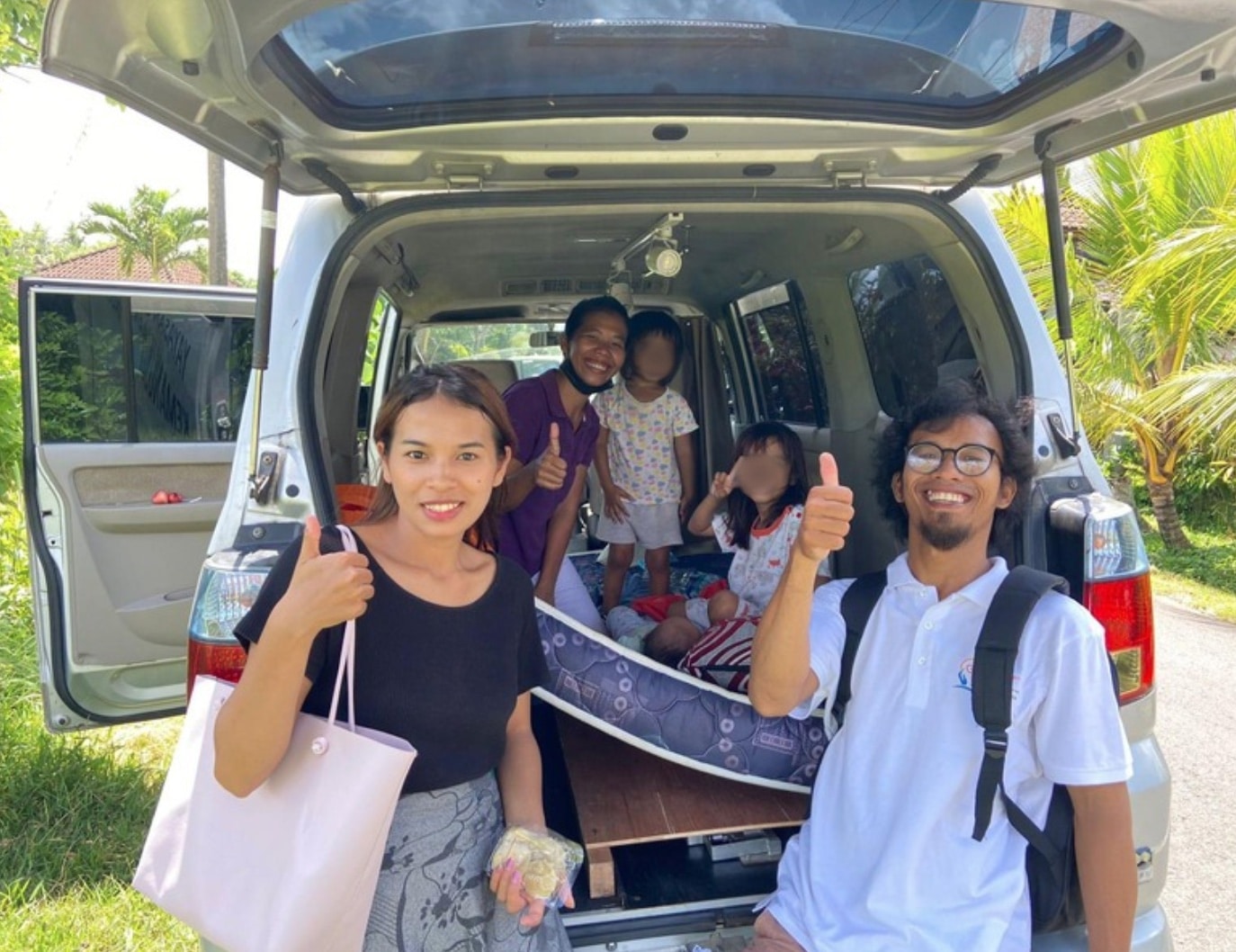
Promised Land – Bali also formed a mobile clinic to treat the sick, and brought in wheelchairs for the handicapped. Photo courtesy of Teo Tee Loon.
“After a few years, we had a good relationship with even people who rejected us previously.
“They wonder, ‘How come you are helping people who oppose you? There must be something different about your religion.'”
“When I gave up my highest goal to get a degree and chose the bottom one – with no money, nothing – to follow God, I was sure that no girl would want to marry me,” Chandra said.
“When I chose the bottom one with no money, I was sure that no girl would want to marry me.”
“But I didn’t care, as long as I followed Jesus.”
He also trusted God to provide for him. He said: “I have never heard of a cross-cultural worker who died because they didn’t have food.”
When he obeyed God, Chandra was in for an even bigger surprise.
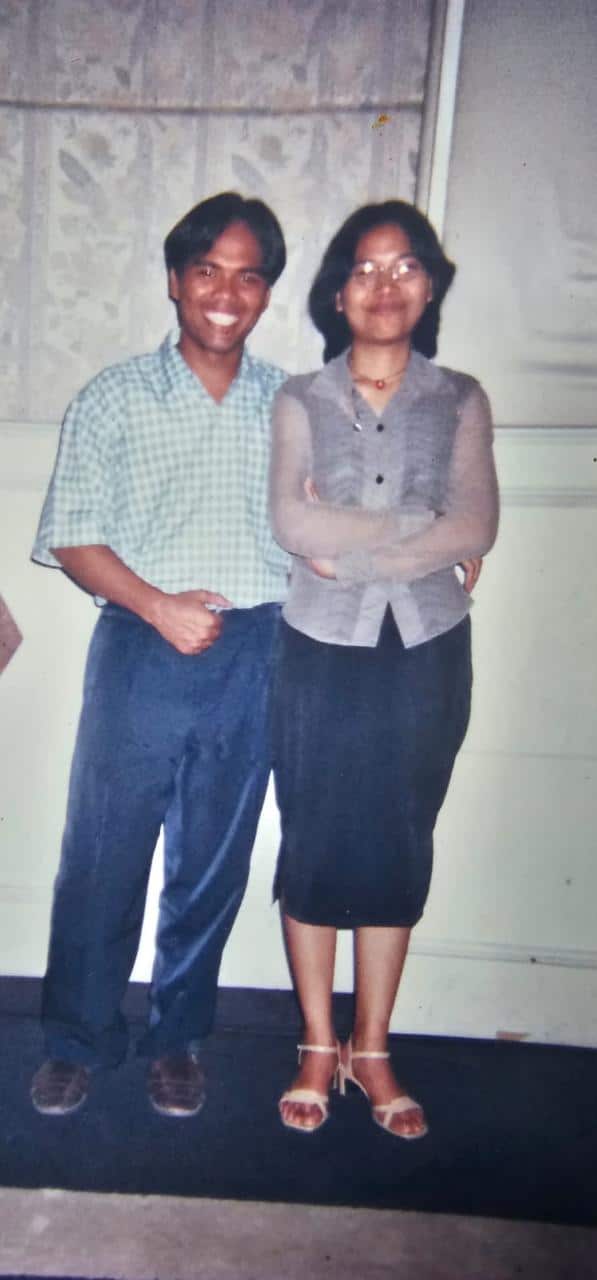
Once Chandra obeyed God and started to plan for his life in Bali, God brought him his future wife.
As soon as he shared with his classmates in Batam what he was planning to do, a female classmate came up to him and shook his hand.
“She said, ‘Thank you, I am really encouraged by your testimony. You really decided to obey God, and recognised that it is His agenda, not yours.’
“I knew then that she was the one for me.”
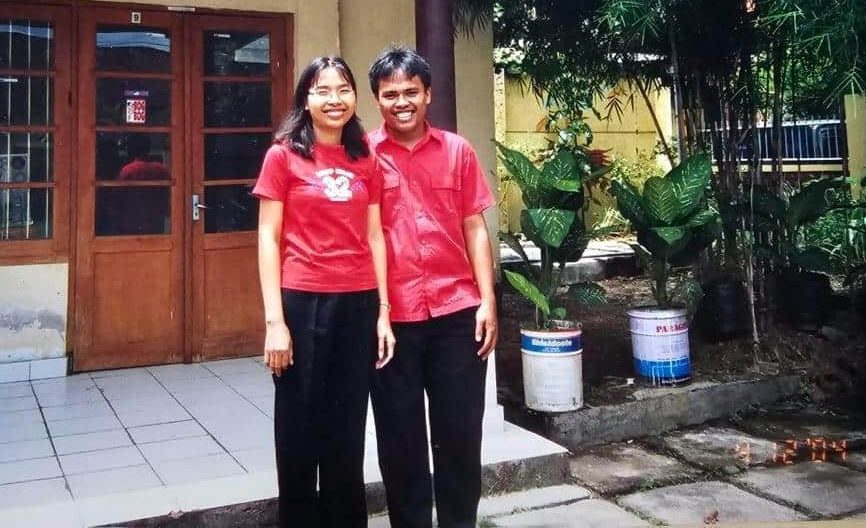
Chandra and Uria in 2004 – the year before they got married.
Two days after they first spoke, Chandra told Uria that he felt “comfortable and at peace” when he was near her. She understood what he was saying, and asked for five days to pray about it. They tied the knot after a two-year courtship.
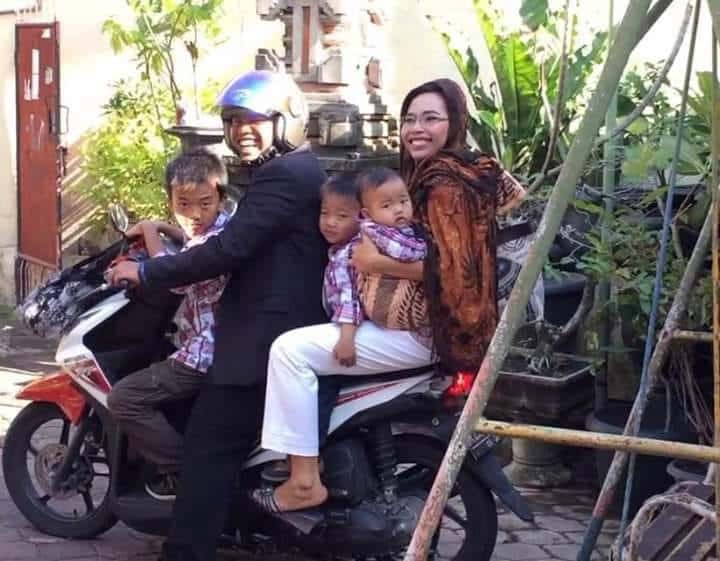
The Tobings’ three sons are now 8, 10 and 17.
The Tobings have three sons who are now 17, 10 and 8.
“They are copying whatever we are doing,” said Chandra, with a father’s pride.
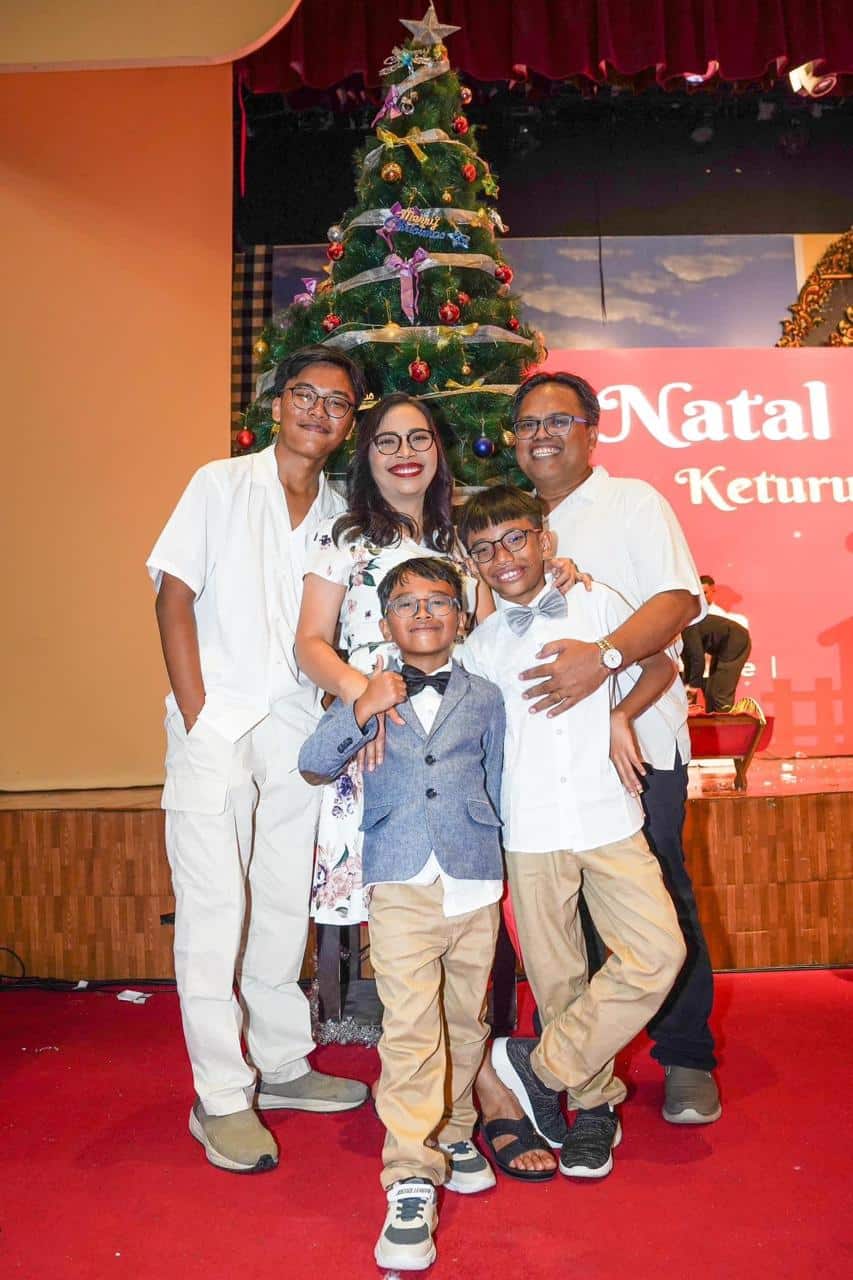
The Tobing boys serve variously as small group leaders and worship leaders in services for kids their age.
“My oldest son, whose English is better than mine, also started his own business selling cakes so that he has his own pocket money,” said Chandra.
“My second son gives five-minute sermons to the kids.
“Recently, one Sunday School teacher visiting from Singapore asked for help to translate a sharing for the kids. My second son said, ‘Hey, I can translate’. My wife and I were so amazed. He did it perfectly; he never studied English.
“My youngest son, 8, has been leading songs and playing the keyboard during the children’s services for more than a year.”
And so the legacy that Nommensen started in the late 1800s lives on in the seventh generation.
If you would like to know more about Jesus, click here to find a church near you.
Click here to join our Telegram family for more stories like Chandra’s.
RELATED STORIES:
30 years ago, a store manager’s simple act of kindness changed a teen shoplifter’s life forever










